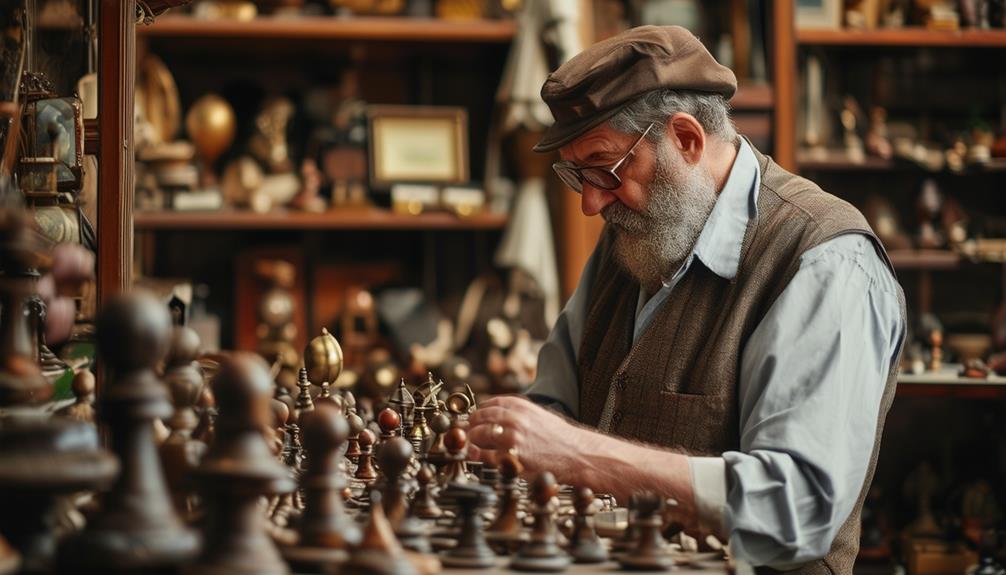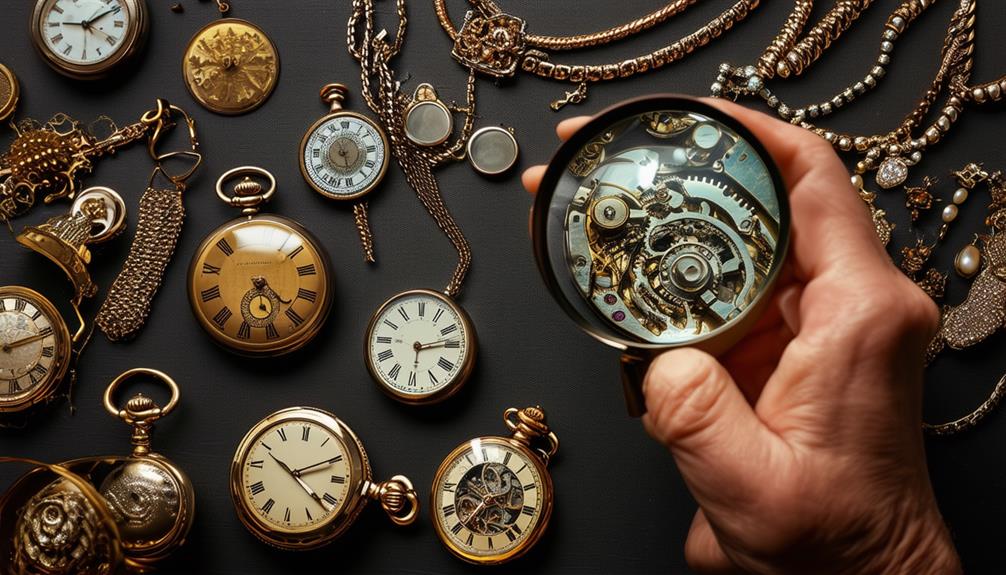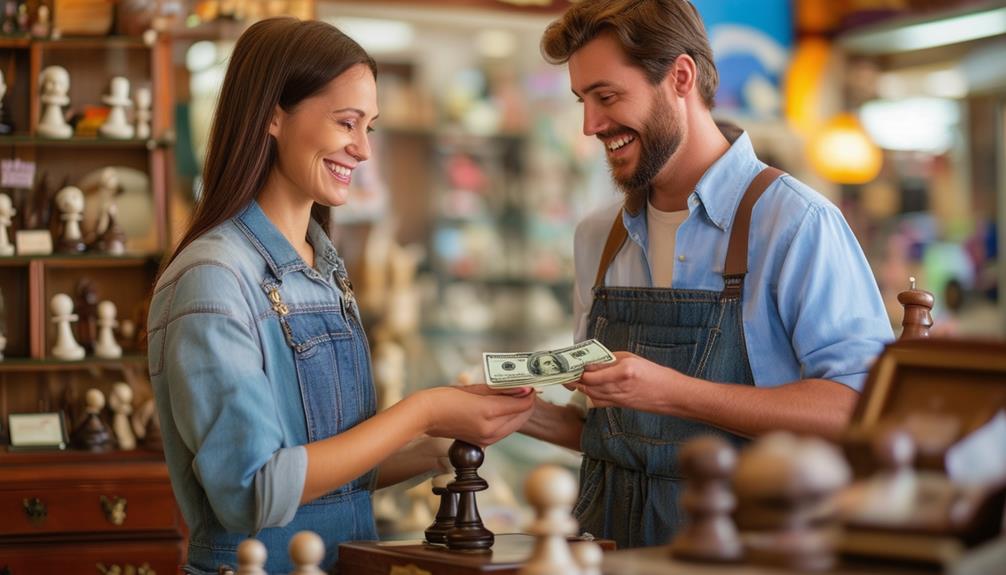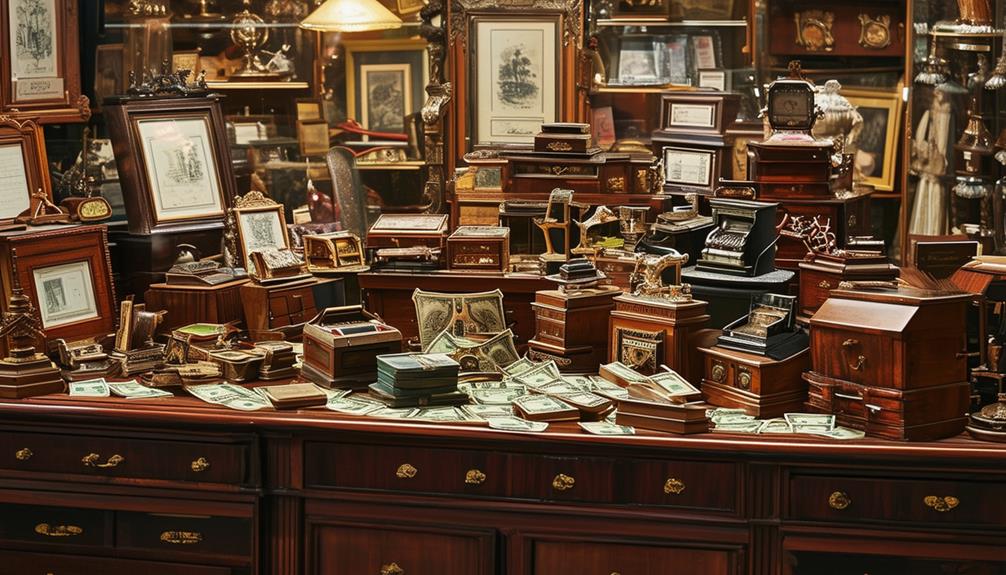Why Pawn Shops Pay Cash for Antiques?
Why Pawn Shops Pay Cash for Antiques?
Pawn shops pay cash for antiques because these items have historical and market value, making them attractive for resale. The condition and market demand greatly influence the cash offers. Authentication by experts is essential for verifying the legitimacy of antiques. Negotiating with pawnbrokers requires understanding the items' worth and establishing trust. Selling to pawn shops offers quick payment and convenience, with flexible terms. To explore further into the process, consider investigating the evaluation methods, alternative selling options, and tips for maximizing cash value.
The Value of Antiques to Pawn Shops

Antiques hold significant value for pawn shops due to their historical significance and potential for high resale prices. Antique appraisers play an essential role in determining the authenticity and value of these items. They use various appraisal techniques, such as examining the age, condition, rarity, and provenance of the antique.
Factors Influencing Cash Offers
When pawn shops consider making cash offers for antiques, they heavily weigh the condition of the item and analyze the current market demand for similar pieces.
The assessment of an antique's condition and the level of demand in the market are key factors that influence the amount of cash a pawn shop is willing to offer.
Item Condition Assessment
Evaluating the condition of an item is a crucial step in determining the cash offer it will receive at a pawn shop. When appraising item condition, pawnbrokers consider:
- Appraisal Techniques: Pawnbrokers use various appraisal methods to determine the value of an item, such as researching similar items that have sold recently.
- Physical Examination: Inspecting the item for any damage, missing parts, or signs of wear helps in gauging its overall condition.
- Potential Repairs: Pawnbrokers assess if any repairs are needed to restore the item to its original condition, which can impact the cash offer.
Market Demand Analysis
In order to determine the cash offer for antiques, pawnbrokers analyze market demand and various factors that influence the value of these items. Understanding antique appraisal methods and current market trends is essential in evaluating the worth of an item.
Pawnbrokers consider the antique collection diversification aspect, where certain pieces may be sought after more than others due to their rarity or historical significance. Additionally, they evaluate the investment potential of the antiques, recognizing that some items may increase in value over time, making them more desirable for both collectors and investors.
Authenticating Antique Items

To guarantee the authenticity of antique items, thorough examination by experts is essential. When authenticating antique items, the following steps are important:
- Appraisal Methods: Experts utilize various appraisal methods to assess the value and authenticity of antique items. These methods may include comparing the item to known authentic pieces, analyzing the materials and craftsmanship, and evaluating the overall condition.
- Provenance Research: Conducting provenance research is necessary in verifying the history and ownership of an antique item. By tracing back the item's origin and previous owners, experts can establish its authenticity and value.
- Consulting Specialists: Seeking advice from specialists in specific types of antiques can provide valuable insights into authenticating antique items. These specialists have in-depth knowledge and expertise in particular categories of antiques, enhancing the authentication process.
Negotiating With Pawnbrokers
When engaging in negotiations with pawnbrokers, it is essential to be well-informed about the value of your antique items. Price negotiation and appraisal accuracy play a significant role in ensuring you receive a fair deal. Building trust with the pawnbroker is also key to successful negotiations, leading to customer satisfaction. Here is an example table that highlights the importance of these aspects:
| Negotiation Tips | Importance |
|---|---|
| Know your item's value | High |
| Be open to offers | Medium |
| Establish rapport | High |
| Consider multiple quotes | Medium |
| Patience is key | High |
Benefits of Selling to Pawn Shops

Building a strong understanding of the advantages that come with selling to pawn shops can help you make informed decisions regarding your antique items. When considering selling to pawn shops, here are some key benefits to keep in mind:
- Quick Payment: Pawn shops offer immediate cash for your antiques, providing a fast and convenient way to access funds.
- Flexibility: Pawn shops are often open extended hours, allowing you to sell your items at a time that suits you best.
- Trust and Convenience: Established pawn shops have a reputation for fair dealings and provide a hassle-free selling experience, making it a reliable option for selling your antiques.
Understanding the Cash Evaluation Process
The evaluation process for determining cash value at pawn shops involves a thorough assessment of the antique items. Pawnbrokers use various appraisal techniques to determine the fair market value of the antiques. These techniques may include researching similar items, considering the item's condition, age, rarity, and overall market demand.
Pricing strategies also play a vital role in the evaluation process, as pawnbrokers aim to offer a competitive price while ensuring a reasonable profit margin. By utilizing their expertise and knowledge of the market, pawnbrokers can accurately assess the value of antiques and provide a fair cash offer to customers looking to sell their items.
This transparent evaluation process helps both parties reach a mutually beneficial agreement.
Alternative Options for Antique Sales

Exploring different avenues for selling antiques can provide sellers with diverse opportunities to reach a wider market and potentially secure better deals. When considering alternative options for antique sales, sellers may find the following avenues beneficial:
- Online Auctions: Platforms like eBay or Etsy allow sellers to showcase their antiques to a global audience, increasing the chances of finding the right buyer for a fair price.
- Consignment Shops: These shops can help sellers by displaying their antiques in a physical store, reaching customers who prefer to see items in person before making a purchase.
- Antique Fairs: Participating in antique fairs or shows can attract enthusiasts and collectors, creating a direct selling opportunity for sellers to interact with potential buyers.
Tips for Maximizing Cash Value
To ensure you receive the highest cash value for your antiques, consider obtaining multiple appraisals from reputable experts in the field. Research methods play an important role in understanding the market value of your items. Utilize online resources, visit antique fairs, and consult with specialized dealers to gather information on pricing strategies.
Take note of the current trends and demand for specific types of antiques to determine the best time to sell. Additionally, investing in professional cleaning and restoration services can greatly enhance the overall appeal and value of your antiques. By implementing these tips and staying informed about market fluctuations, you can maximize the cash value when selling your antiques.
Frequently Asked Questions
Do Pawn Shops Provide Appraisals for Antiques?
Pawn shops often provide appraisals for antiques through their appraisal process. This typically involves antique experts who assess the value of the items brought in.
These experts rely on their knowledge and experience to determine the authenticity and worth of the antiques. Customers can benefit from these appraisals as they help establish the value of their items, which can be pivotal when deciding to sell or pawn them.
Can I Sell Damaged Antiques to Pawn Shops?
When selling damaged antiques to pawn shops, the process may vary. It is crucial to inquire about repair options and how they impact the selling process.
Some pawn shops may accept damaged antiques, while others may prefer items in better condition. Understanding the shop's policies on damaged items and potential repair costs can help you make an informed decision before selling.
What Happens if I Change My Mind After Selling?
If you experience buyer's remorse after selling an item to a pawn shop, your options may be limited. Most pawn shops have strict return policies, and reversing your decision might not be possible.
It's essential to carefully consider your choice before finalizing a sale, as regretting it later could lead to complications. Always inquire about a pawn shop's return policy beforehand to avoid potential issues in the future.
Are There Specific Antique Items Pawn Shops Prefer?
When it comes to specific antique items preferred by pawn shops, antique furniture, paintings, vintage jewelry, and watches tend to catch their eye. These timeless pieces hold value and allure, making them desirable for both collectors and sellers.
The craftsmanship and history embedded in these items make them sought-after treasures in the world of pawnshops. These unique antiques often fetch good prices and attract attention from both buyers and sellers alike.
Will Pawn Shops Buy Antique Reproductions?
When considering whether pawn shops will buy antique reproductions, it is important to understand that pawn shops typically prefer authentic antiques due to their higher value and market demand.
Antique reproductions may not command the same level of interest or value in the antique market. However, some pawn shops may still consider purchasing reproductions based on their individual criteria and customer demand.
It is advisable to consult with the specific pawn shop regarding their policies on antique reproductions.
Conclusion
To sum up, when selling antiques to pawn shops, remember the saying 'one man's trash is another man's treasure.'
The value of antiques to pawn shops is influenced by various factors, such as authenticity and market demand.
By understanding the cash evaluation process, negotiating with pawnbrokers, and exploring alternative options, individuals can maximize the cash value of their antique items.
Overall, selling antiques to pawn shops can be a beneficial and profitable transaction.

